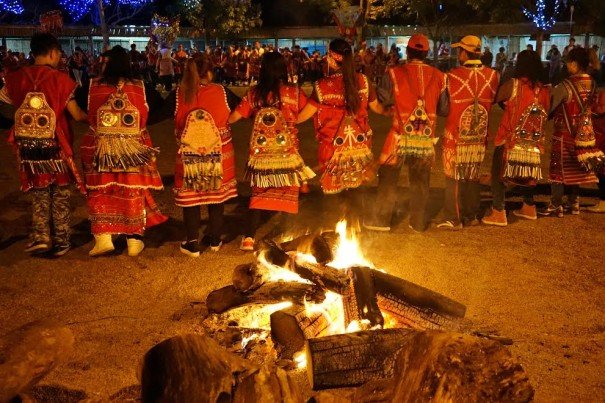
Millet Wine with the Aborigines of Taiwan

Millet Wine with the Aborigines of Taiwan
“Gan bei!” – drink up! My friend’s elderly mother-in-law tries to force me to pour another shot of yellow mijiu—millet wine—down my throat. It tastes like Japanese sake but warmer, sweeter and stickier.
I’m drinking this in the village of Wufeng in Hsinchu County, home to the Saisiyat, one of the smallest remaining aboriginal tribes in northwest Taiwan. The surrounding area has endless green mountain ranges and valleys that dip into turquoise-colored hot springs. Sometimes, the water is so hot that steam rises from the valleys, with the telltale stench of the sulfur that’s supposed to make the waters good for your skin. Parts of the mountains have now been shaved off to create tourist paths, where rows of mom-and-pop shops sell headbands, clunky jewelry, and mijiu daily to visitors from Taipei and beyond.
But there is no tourist event quite as large as this one. Every two years in November, the Saisiyat people hold a ritual called Pasta’ay to appease the spirits of a mythical pygmy race known as the Short Black People whom they are said to have eradicated thousands of years ago (anthropologists think that they could have been related to other Africanoid tribes from the Philippines or Papua New Guinea). As the victors in their story, the Saisiyat can tell the tale the way they want to, so the legend now has it that the Short Black People had no women in their tribe, so they raped the Saisiyat women, and to exact revenge, the Saisiyat chopped off the bridge which the Short Black People were using to cross over to their side. Without access to crops on their side of the mountains, the Short Black People slowly died off.
For the last hundred years, the Saisiyat have been conducting Pasta’ay so the spirits of the Short Black People won’t haunt them and threaten their tribe’s survival. Sometimes the ritual lasts for 10 days, sometimes for 30, because the Saisiyat must ensure that the spirits are ready to cross over into this world. The dancing lasts from 6pm to 6am, from sundown to sunrise, each day. Non-aboriginals are only allowed to participate on the last two days, and those two days have become one of the biggest tourist events in this part of the island. For them, the entire ritual is fueled in part by lots of alcohol—most notably, mijiu.
When I asked my friend, a New Zealander who married a Saisiyat woman and had the name O’bay bestowed upon him by the tribe’s elders, to help arrange interviews with some tribal members for an article I was writing, he only had one question: did I drink? When I said yes, he smiled and said it should be no problem.
After my fourth or fifth shot of mijiu, watching his mother-in-law refill my plastic cup each time, I am regretting those words. This little old lady and all the other little old ladies are out-drinking me thanks to decades of chugging the sweet yellow liquid. Mijiu is, after all, the oldest wine harvested in Taiwan, and has long been a key component of aboriginal rituals, not just the touristy ones. Traditionally, they drink mijiu in a circle as an offering to one’s ancestors and to ward off evil spirits. Consuming it brings good fortune to the community. Only in the last decade or so has mijiu become a way to lure travelers into the mountains.
Activists have criticized the government for allowing these sacred rituals to turn into tourist events. Tour buses clog the narrow mountain roads and visitors overrun the hot springs. In my visit, I notice the Saisiyat headdresses and vests on sale—some for hundreds of dollars—as a testament to the commercialization of Pasta’ay.
A few more shots of mijiu later, I finally manage to interview the Hsinchu County Commissioner. As a non-aboriginal Taiwanese, he mentions wanting to elevate Pasta’ay not just to a national festival, but an international one as well. I attempt to ask him what steps he was taking to accomplish this and whether the Saisiyat are on board with his plan, but his drunken brother puts an abrupt end to our conversation.
I try bringing up similar questions with other members of the Saisiyat tribe but it’s difficult: they are dancing, drinking and scrambling all over the place. “We’re on mountain time. Relax!” my New Zealander friend says, handing me some more mijiu.
I have a few more swigs, letting the warm sweetness swish in my mouth before gulping it down.